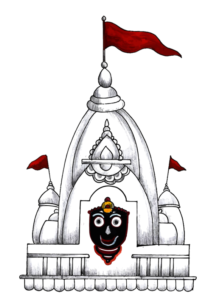
The Eminent Shiv Temple
Lal Keshwar Mandir
A Sanctuary of Faith
Introduction :
The Lal Keshwar Shiv Temple, a revered Hindu place of worship nestled in the heart of Hajipur, Bihar, bears testimony to centuries of devotion and faith. This research article embarks on a journey to uncover the historical, cultural, and spiritual significance of this sacred temple, delving into the profound rituals and the unwavering veneration of Lord Shiva that have thrived through the annals of time.
A Glimpse into Timelessness :
The Lal Keshwar Shiv Temple, located at Bagmusa in Hajipur, Bihar, holds a hallowed presence that transcends time. This temple serves as a testament to the faith and devotion that have blossomed in the hearts of countless devotees. At its core, it venerates Lord Shiva, who is adored in the timeless form of a Lingam, a symbol of the divine presence of the Lord.
The Lingam, a revered object in Hinduism, symbolizes the physical embodiment of Lord Shiva and carries a spiritual significance that transcends the bounds of mere symbolism. It is the focal point of worship, an enduring connection between devotees and the divine.
The Deity – Lord Shiva :
The Lal Keshwar Shiv Temple finds its essence in the veneration of Lord Shiva, one of the principal deities in the Hindu pantheon. Devotees regard Lord Shiva as the cosmic dancer, the ascetic yogi, and the destroyer of evil forces. The temple carries the echoes of Shivratri, a significant Hindu festival dedicated to Lord Shiva.
Shivratri, known as the “great night of Shiva,” is an annual celebration marked by prayer, fasting, and meditation. Held on the 13th night and 14th day of the Maagha or Phalguna month of the Hindu calendar, Shivratri is a spiritually profound event where devotees seek Lord Shiva’s blessings and guidance.
Cultural and Religious Significance :
The Lal Keshwar Shiv Temple is not just a place of worship; it is a haven of culture and spirituality. It has become a cultural hub where devotees from diverse backgrounds unite to partake in rituals and traditions that have endured for generations.
Devotees pour into the temple, their rituals accompanied by the resonant echoes of temple bells, the wafting fragrance of incense, and the sacred chants of mantras. These customs, deeply rooted in tradition, contribute to the temple’s sacred aura, infusing the air with devotion and reverence.
Conclusion :
The Lal Keshwar Shiv Temple, set amidst the bustling city of Hajipur, Bihar, serves as a testament to the timeless power of faith and devotion. It stands as a symbol of undying veneration, where history, culture, and spirituality merge seamlessly. The Lingam at the heart of this temple is not just a representation; it is a living connection between the devotees and the divine.
This temple is not merely a physical edifice; it is a repository of sacred traditions and rituals that have been preserved and cherished over centuries. It reminds us that faith knows no boundaries, and spirituality transcends the confines of time.
Main Findings :
• The Lal Keshwar Shiv Temple in Hajipur, Bihar, is a Hindu place of worship dedicated to Lord Shiva, with a profound emphasis on the Lingam as the symbol of Lord Shiva’s divine presence.
• Lord Shiva, a principal deity in Hinduism, is revered for his roles as the cosmic dancer, ascetic yogi, and the destroyer of evil forces. The temple marks the significant festival of Shivratri in honor of Lord Shiva.
• The temple is not just a spiritual site but also a cultural and religious center where devotees from diverse backgrounds come together to participate in time-honored rituals and traditions.
• The Lal Keshwar Shiv Temple is more than a physical structure; it is a testament to the enduring power of faith and devotion, transcending both time and boundaries.
Editor – Kaalchakra Team
[ Note – Before Concluding anything as a Finale, Please Go through Original Scriptures of Vaidik Literature Written in Sanskrit and Also with Meaning of That time of Language. Because English is a Limited language to Explaining the Deeper Knowledge of Vaidik Kaal. ]
